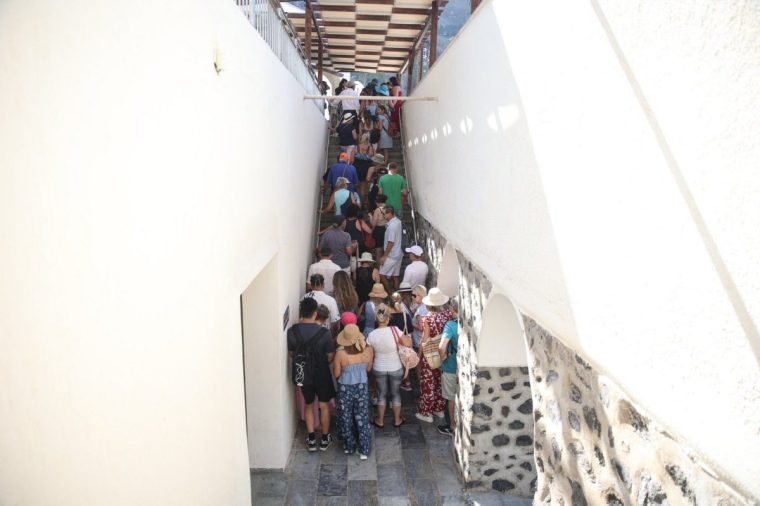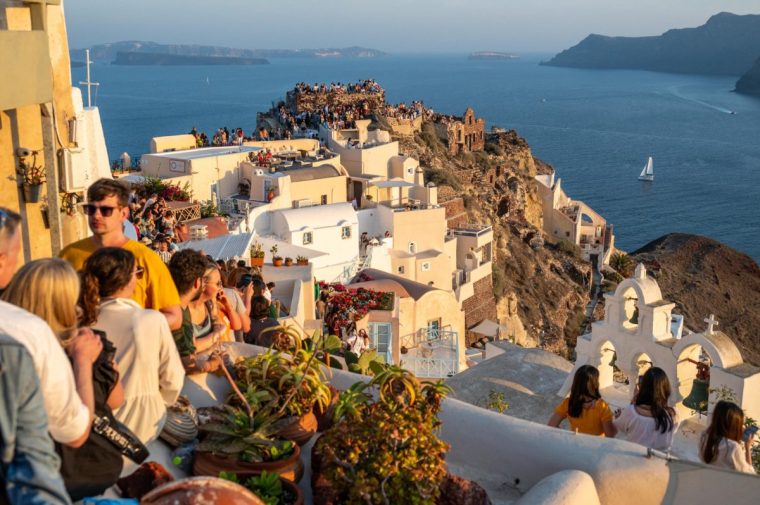The ferry judders to a halt inside the world’s only inhabited caldera. Around us Santorini’s volcanic cliffs tower in a red-and black- lava sandwich to a distant glitter of snow-white villages high above. It’s a spectacular sight, but there’s no time to admire it.
The wind is fierce and the metal ramp shifts and bounces on the tarmac as thousands of passengers spill through the ferry’s open doorway competing with cars, lorries and buses to reach dry land.
“It’s a nightmare – people often slip and fall,” taxi driver Manolis told i as he runs to get his car and get out of the port before the flow of traffic starts.
Climbing steeply away from Santorini’s tiny harbour the winding road ahead of us is barely wide enough to allow two cars to pass, let alone lorries and coaches, so bottlenecks are frequent.
Manolis says it often takes half an hour or more just to climb 700 metres to the main road above. “We have all this tourism money, but look at the state of this road. It’s one of Greece’s busiest ferry ports, but the road is only just good enough for donkeys,” he fumes, idling behind a line of vehicles.
Director of local transportation company V.I.P Transfers & Tours George Alexandrou agrees. “Santorini faces serious infrastructure issues due to the fact that government funding is tied to the size of the local population – increased investment is crucial,” he said.

Waste management is also a huge problem on this 76km square island with a population of 20,000 which attracts 3.4m visitors per year. “During the peak season there is garbage everywhere,” Mr Alexandrou said.
Although there have been none of the protests against tourists that have been seen in Barcelona and other areas suffering from overtourism, resentment has simmered on Santorini since mid-July when local politician, Panos Kavalaris, called on residents to limit their movements in order to leave room for tourists.
“Not only do we have to put up with them, now we have to hide in our houses to make way for them,” one resident of Oia, the caldera-edge village where visitors flock to watch sunset, said angrily.
“We face all the problems of a big city, even though we are not designed to be a big city or to deal with these problems,” the island’s mayor, Nikos Zorzos, told i in a previous interview.

One of the island’s major problems is overbuilding. According to a report by the University of The Aegean, a multi-campus university on the islands of Lesvos, Chios, Samos, Rhodes, Syros and Lemnos, concrete on Santorini covers around 15 percent of the island’s total surface compared to an average one percent on surrounding islands.
Dr Lauren Siegel who is a senior lecturer in tourism and events management at the University of Greenwich in London conducted research on the effects of over tourism in Santorini prior to the pandemic. Dr Siegel says that if something isn’t done soon, the island is likely to become unliveble for locals.
“Although more jobs and more tourism is brought into the island, the local population doesn’t necessarily benefit from this. Tourism causes inflation, making local goods and services unaffordable for local people,” she said.
Much of the blame for overcrowding is put on cruise ship tourists – which can carry as many as 17,000 tourists a day to the island.
As one of his key economic policies for 2025, Greek PM Kyriacos Mitsotakis announced a €20 (£16) levy on cruise ship passengers.
The move has caused consternation amongst tourism professionals, including the Cruise Lines International Association (CLIA), who said in a recent statement: “Any increase in the existing port fee should be fit for purpose, proportionate to the specific port investment needs and apply across all visitors, with revenues directly reinvested into port operations and the local communities.”
Greece earned around €42.7bn from tourism this year. According to the Greek Ministry of Tourism the new taxes will bring in another €50m. On the way back to Santorini’s ferry port Manolis points out the potholes, dangerous bends and lack of signals en route.
“There are so many tourists but these roads haven’t been properly fixed for years,” he said. “If the government is collecting even more money from Santorini, perhaps they will finally invest in our infrastructure?”


